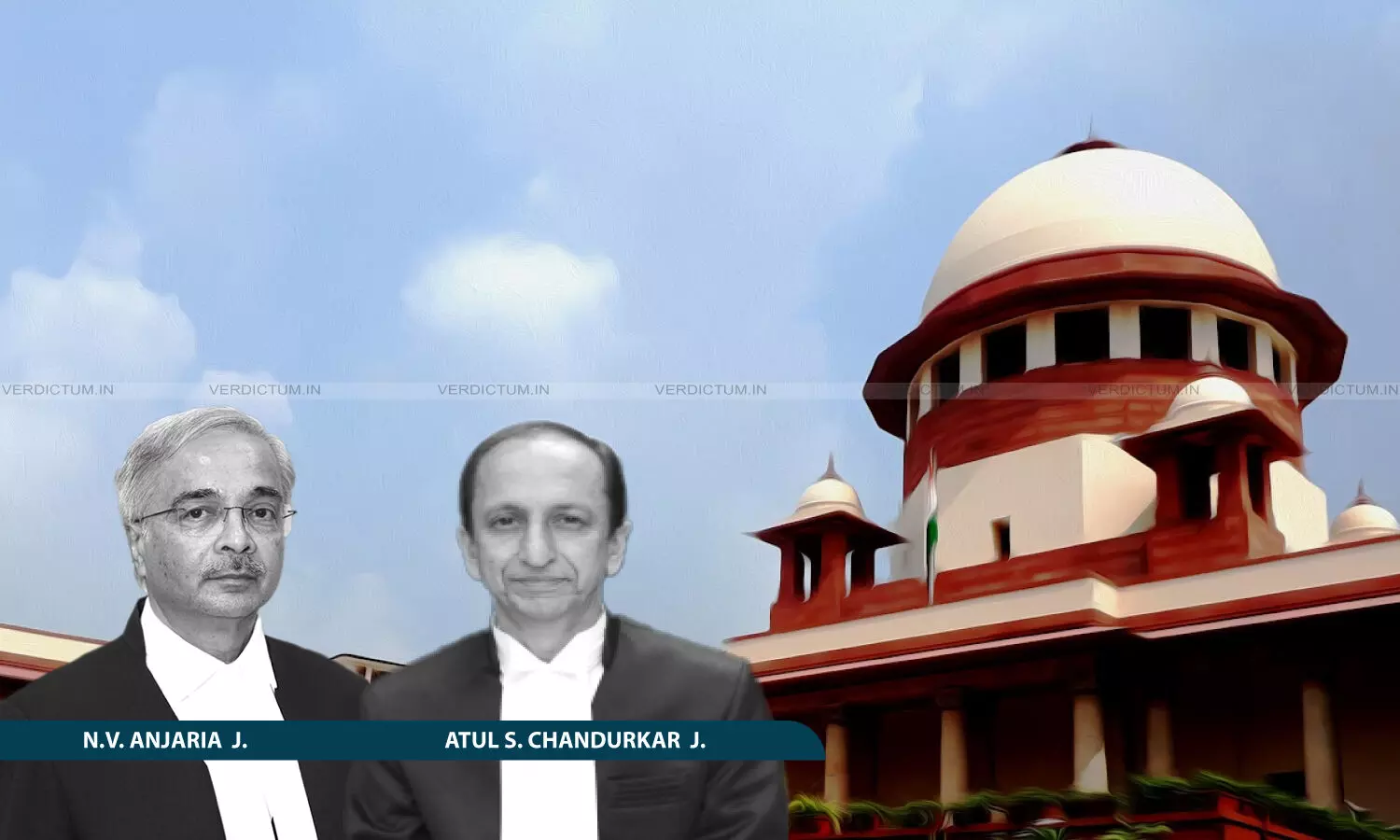
Justice N.V. Anjaria, Justice Atul S. Chandurkar, Supreme Court
Prolongation Of Criminal Case For Unreasonable Period Amounts To Mental Incarceration: Supreme Court Reduces Woman Officer’s Sentence In Corruption Case
 |
|The Criminal Appeal before the Supreme Court was filed against the order confirming the conviction of the appellant under the Prevention of Corruption Act, 1988.
The Supreme Court has reduced the sentence imposed upon a 75-year-old woman, who was posted as an Inspector of the Central Excise, to the period already undergone by her in a corruption case. The Apex Court observed that the prolongation of a criminal case for an unreasonable period is in itself a kind of suffering and the same amounts to mental incarceration.
The Criminal Appeal before the Apex Court was filed against the order of the Madurai Bench of the Madras High Court confirming the judgment of the Special Judge, Central Bureau of Investigation (CBI) convicting the appellant for the offences under Section 7, Section 13(2) read section 13(1)(d) of the Prevention of Corruption Act, 1988.
The Division Bench of Justice N.V. Anjaria and Justice Atul S. Chandurkar held, “The aspects in the present case as highlighted above that the incident had occurred more than 22 years ago and that the age of the widow appellant is 75 years who stays alone, the Court finds it appropriate that she may not be made to undergo the imprisonment again. In the totality of the facts and circumstances, the imprisonment already undergone by her is treated to be adequate sentence.”
The Bench also stated, “The prolongation of a criminal case for an unreasonable period is in itself a kind of suffering. It amounts to mental incarceration for the person facing such proceedings. For a person who is convicted and who has appealed against his or her conviction and sentence and who everyday awaits the fate of litigation, spends time in distress. In the present-day system of administration of justice, in which proceedings have often go on protracted unreasonably and therefore unbearably, the passage of long time itself makes the person suffer a mental agony.”
Senior Advocate V Chitambaresh represented the Appellant, while Senior Advocate R.Bala represented the Respondent.
Factual Background
The appellant had been serving as an Inspector of the Central Excise. The complainant (PW-2), who was a supervisor at Parani Match Factory at Sengamalapatti of Sivakasi Taluka, made an application for the grant of a fresh central excise registration certificate for its factory. It was the case of the prosecution that the appellant demanded illegal gratification of a sum of Rs 300. The complainant did not pay the bribe amount, although he was pressurised and threatened. For want of payment of said amount by the complainant, the release of the certificate was delayed that led to the lodging of the complaint.
The Competent Authority – Commissioner of Central Excise and Customs (PW-1), granted sanction to prosecute the appellant. The charge sheet came to be filed. At the end of the trial, Special Judge, CBI convicted and sentenced the appellant, which was upheld by the High Court. It was in such circumstances that the appeal came to be filed before the Apex Court.
Reasoning
The Bench, at the outset, explained, “This Court has been consistent in approaching and dealing with the cases where the sentence already undergone by the convict is treated to be adequate sentence for variety of mitigating factors and circumstances operating in the case.”
Throwing light on the principles guiding the process of sentencing, the Bench observed, “The process of sentencing by the courts is guided by theories such as punitive, deterrent or reformative. Each school of thought has its own object and purpose to explain awarding of sentence and its utility. Amongst these theories, reformative approach has become increasingly acceptable to the modern jurisprudence. Reformation is something always considered progressive. When there are mitigating circumstances, the court would lean towards reducing of the sentence. The focus would be on the crime, and not on the criminal. The society and system would nurture the guilt with positivity, while selecting the sentence.”
Coming to the facts of the case, it was noticed by the Bench that the appellant underwent imprisonment for 31 days. It was brought to the Court’s notice that the appellant is a 75-year-old widow, who has been staying alone and belongs to a scheduled caste.
Dismissing the appeal and confirming the conviction with modification, the Bench ordered, “The sentence awarded to the appellant is accordingly reduced to the actual undergone. At the same time the imposition of fine is required to be increased. The appellant shall be liable to pay fine of ₹25,000/- over and above originally imposed.”
Cause Title: K. Pounammal v. State Represented by Inspector of Police (Neutral Citation: 2025 INSC 1014)
Appearance
Appellant: Senior Advocate V Chitambaresh, AOR M. A. Chinnasamy, Advocates C Raghavendren, C Rubavathi, Ch. Leela Sarveswar, Padhmanabha Raja K R
Respondent: Senior Advocate R.Bala, AOR Arvind Kumar Sharma, ASG Archana Pathak Dave, AOR Mukesh Kumar Maroria, Advocates Amit Sharma-B, Archana Surve Shinde, Sunanda Shukla